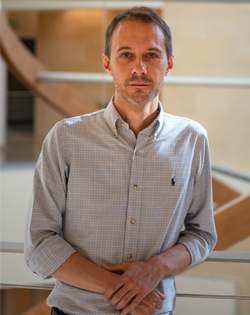Stem Cells & Timing of Neural Development in Health and Disease
Gabriele Ciceri

Email: ciceri.gabriele@hsr.it
Location:
SR-Tiget Group Leader, Stem Cells & Timing of Neural Development in Health and disease
My interest for developmental neurobiology is rooted early in my university studies. I was struck by the ability of the cells to get organized and build with precision highly complex tissues. How do cells know what to do? and how do they do it at the right time?
I received my BS and MS in biotechnology from the University of Milan and completed my MS thesis at San Raffaele Scientific Institute at the intersection of cell biology and neuroscience. Soon after, I joined the lab of Oscar Marín for my PhD training at the Neuroscience Institute CSIC-UMH, in Alicante, Spain. There, I investigated how the diversity of neuronal cells is generated by combining retroviral labelling with mouse genetics to tag neural progenitors with fluorescent reporters and trace their progenies with regional specificity. These works dissected principle for the in vivo development and spatial organization of inhibitory and excitatory neuronal lineage in the cerebral cortex. I also investigated molecular and morphological strategies of neuronal migration. I further refined my understanding of the “language” of cell differentiation as a postdoctoral fellow with Lorenz Studer at Memorial Sloan Kettering Cancer Center in New York, where I worked to build my own experimental models using human pluripotent stem cells (hPSC). My work established novel platforms to differentiate hPSC into neural cells, including a human 3D brain organoid that recapitulates the emergence of a progenitor type highly enriched in the human brain, and a 2D platform to generate postmitotic human neurons at high purity and synchronicity. The last gave me a tractable experimental system to tackle mechanisms driving timing during neuronal maturation, with the establishment of a multidimensional maturation atlas for hPSC-derived cortical neurons. Furthermore, my work identified an epigenetic switch that pre-set the slow pace of maturation well before neurons are born, with novel mechanistic and conceptual insights into this unique aspect of human neurobiology. Importantly, manipulation of this epigenetic program can accelerate neuronal maturation in hPSC-based models, a finding that we have recently expanded to the timing of cell fate specification across all the three germ layers. I was awarded the FPI predoctoral fellowship and PhD extraordinary price, an EMBO long-term fellowship and NYSTEM postdoctoral training award. In 2025, I was awarded the Career Development Award from the Armenise Harvad foundation to launch my lab at SR-Tiget.
